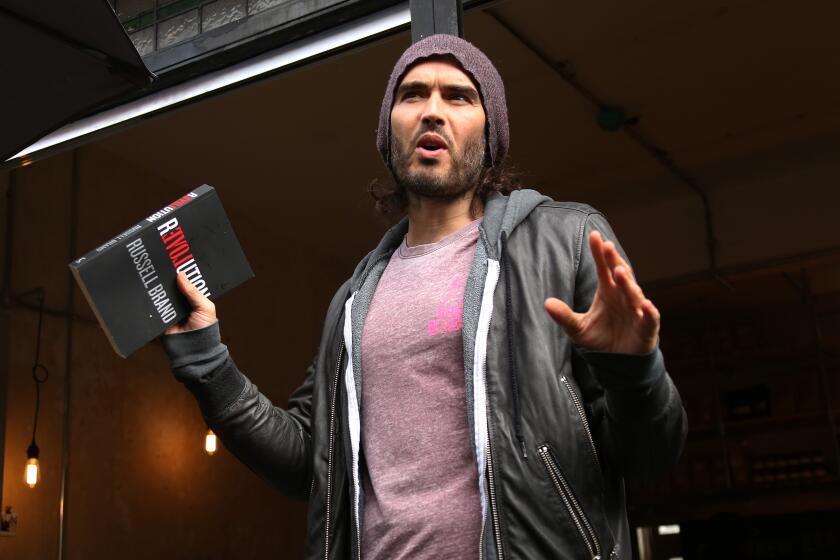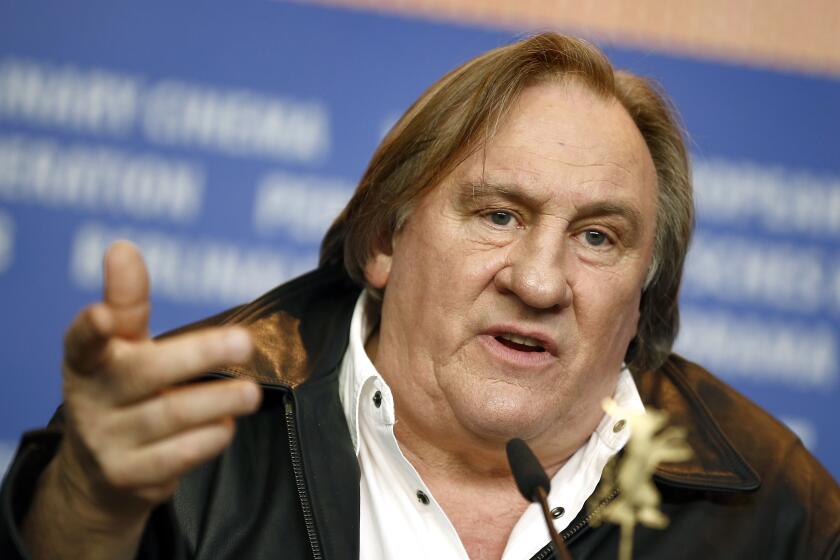Director Lee Chang-dong and actor Steven Yeun on the profound mysteries of ‘Burning’
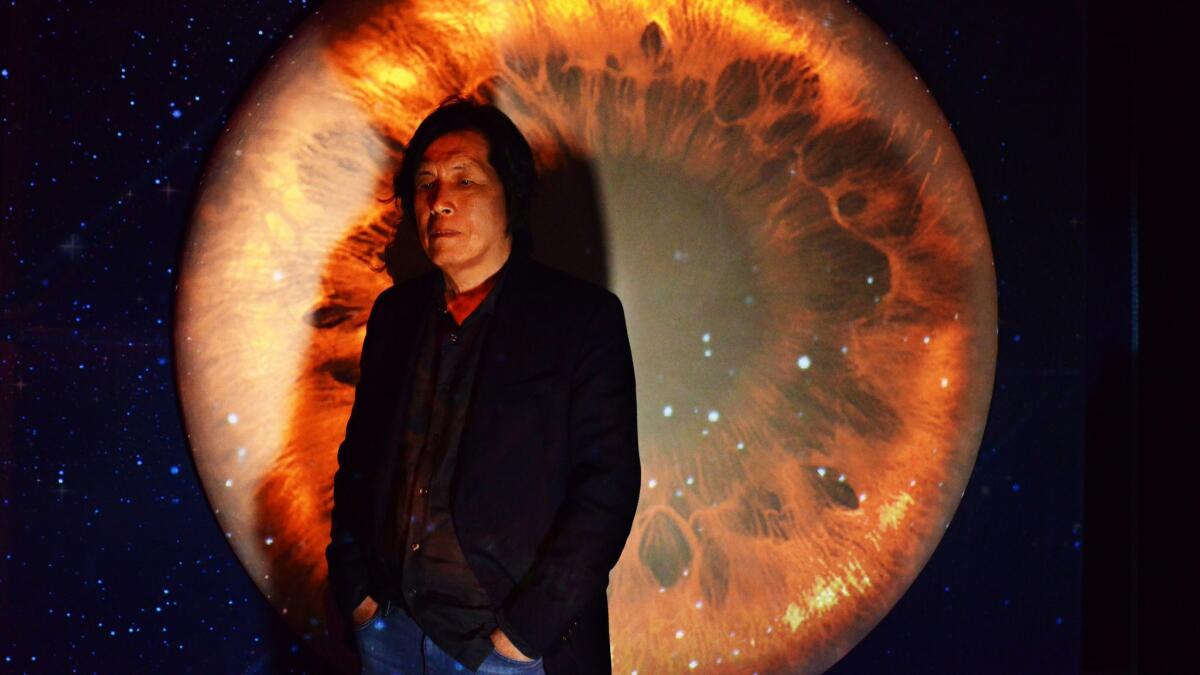
Early on in “Burning,” the gripping new psychological thriller from South Korean filmmaker Lee Chang-dong, a shy, troubled young man named Jongsu (Yoo Ah-in) returns to a small farmhouse in the town of Paju, where he’s lived since childhood. President Trump can be seen and heard blaring from a TV in the background, a throwaway detail that becomes more disquieting when it’s revealed that Jongsu lives close to the border with North Korea.
Adapted and transplanted from a 1992 short story by Haruki Murakami, “Burning,” a runaway critical favorite at the recent Cannes Film Festival, is less about any geopolitical turmoil than it is about class privilege, youthful ennui and frustrated longing.
But for Lee, the 63-year-old writer-director of such acclaimed character studies as “Secret Sunshine” (2007) and “Poetry” (2010), there is something undeniably resonant about the fact that his first film in eight years has arrived at a tense, potentially historic moment on the Korean peninsula.
“This is a film about anger. I think everyone is angry these days. I think it was also some people’s anger that made Trump president,” Lee says. “What I pay attention to is the anger of young people. Youngsters don’t understand why they don’t have a future or hope. They don’t have a specific target for this anger.”
The movie keeps that rage pulsing, steadily but ambiguously, in scene after scene; it’s the very definition of a slow burn. Lee was a renowned author before he became a filmmaker, and his movies are often praised for their novelistic density — their deliberate pacing, subtle emotional modulation and richly textured sense of place. While these stories come to poignant, sometimes tragic ends, they never feel rigid or deterministic, thanks to Lee’s ability to capture moments that feel carefully sculpted yet powerfully unresolved.
“Burning” is no exception. For 2 1/2 hours, this leisurely but ruthlessly unpredictable movie follows Jongsu as he falls hard for an old childhood friend, Haemi (Jeon Jong-seo), only to watch as she begins seeing Ben (“The Walking Dead’s” Steven Yeun), a rich, young man from Seoul. Rather than erupting immediately, the tensions remain on a low simmer, gradually propelling this romantic triangle into mystery-thriller territory.
The result is an empathetic but unsparing study in human fragility and torment, much like Lee’s “Peppermint Candy” (1999) and “Secret Sunshine” (2007), which won an acting prize at Cannes for its star, Jeon Do-yeon, and catapulted the director to international prominence. Lee returned to Cannes three years later with the equally admired “Poetry” (2010), which won a screenplay award. (Yun Jung-hee, the star of “Poetry,” was later named the year’s best actress by the Los Angeles Film Critics Assn.)
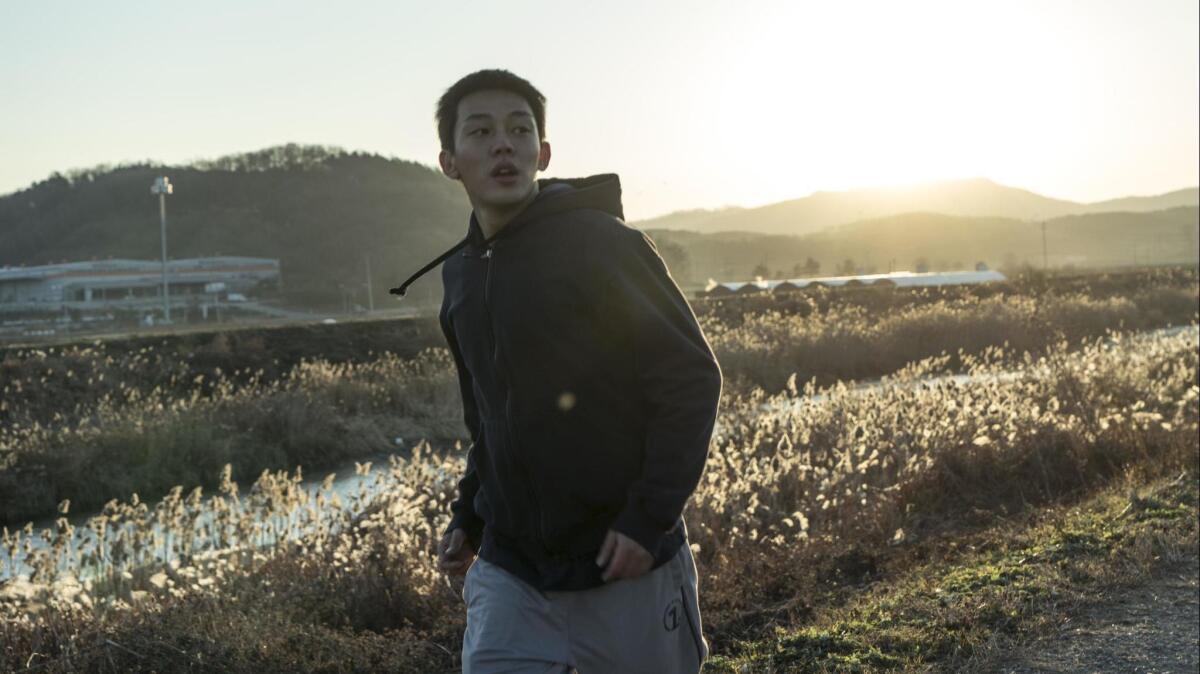
“Burning” is Lee’s third and most unanimously acclaimed feature to screen at Cannes, where it received an unprecedented average score of 3.8 out of 4 stars on the annual Screen International critics’ grid, beating out even the previous record (3.6) held by 2016’s “Toni Erdmann.” (Full disclosure: I was one of 10 critics who participated in the poll.)
But like “Toni Erdmann,” “Burning” didn’t succeed in parlaying its critical love into recognition from the official jury. While it was named the best film in the competition by the international critics’ organization FIPRESCI, it left the festival’s awards ceremony empty-handed.
Still, the prospect of awards seems far from Lee’s mind when we sit down on a pier overlooking the Mediterranean the day after his film’s premiere. Friendly yet hushed and grave in demeanor as he speaks through an interpreter, he seems to radiate the wisdom of a few past lives, or at least past careers: In addition to working as a high-school teacher and novelist, he served as South Korea’s minister of culture and tourism from 2003-04.
His third trip to Cannes has been a bittersweet one. Just a few days before the festival was set to begin, news arrived that Pierre Rissient, a longtime champion and tireless promoter of world cinema, had died at 81 in Paris.
Rissient’s behind-the-scenes advocacy helped bring famed auteurs like Clint Eastwood, Jane Campion, Mike Leigh and Hou Hsiao-hsien to the attention of international tastemakers. He had played an instrumental role in bringing Lee to the attention of Cannes and the broader film world, and was hard at work on the “Burning” campaign the week before he died.
“The emotions I feel go beyond mere sadness. I’m still in shock,” Lee says. “Until his death, he was so passionately dedicated to promoting this film.”
READ MORE: Justin Chang's day-by-day Cannes diary »
Rissient had continually pushed Lee to make a film all through his eight-year dormancy. During that time the director considered several other projects, three of which became finished screenplays before falling apart.
“Strangely enough, I couldn’t find a definitive reason as to why they had to be made into films,” he says. “I was searching for something different ... but I wasn’t sure what it was exactly. I cannot say that ‘Burning’ is an entirely new and original kind of film, but it’s a film that has come closest to the new style of storytelling that I’ve been searching for.”
Some elements from those aborted projects made their way into “Burning,” which deviates significantly from “Barn Burning,” the Murakami short story on which it’s based. Securing the rights to the material delayed the production by a year, during which time Lee and his co-writer, Oh Jung-mi, elaborated and deepened the script. The movie’s second half is almost entirely of their own devising.
It was also during this waiting period that Lee, who had been planning to cast a local Korean actor as Ben, decided to look further afield. He ended up choosing the Seoul-born, Michigan-raised Yeun, who remains best known for playing Glenn Rhee, a popular character on “The Walking Dead.”
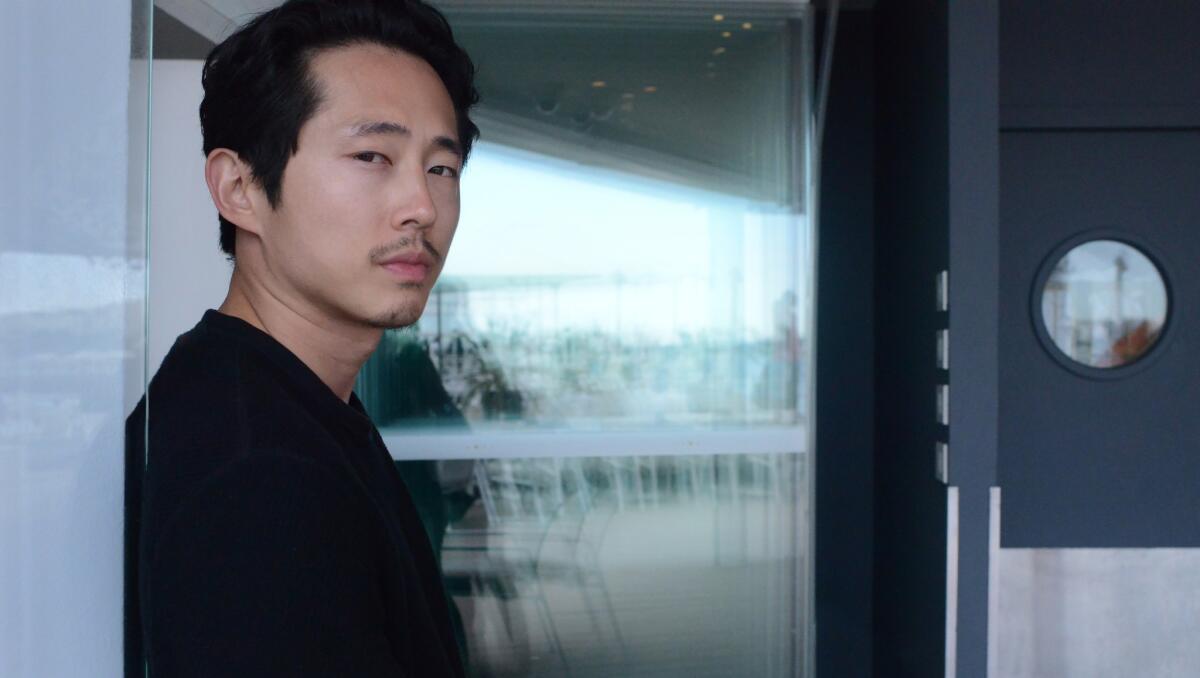
“Burning” marks Yeun’s second collaboration with a major Korean auteur after Bong Joon-ho’s “Okja” (2017), in which he played a bilingual environmental activist. He admits he didn’t feel confident initially about working with Lee, whom he reveres.
“I don’t want to ruin his filmography,” he recalls thinking. “I don’t want to do something I had no business doing.”
But Lee persuaded him that he was a good fit for Ben, the enviably privileged and sophisticated man who keeps Jongsu unnervingly close even as he pushes him aside. In the end, Yeun found he couldn’t refuse.
“The first reason I cast Steven was because he was a successful man, a man with a success ordinary people cannot even dream of,” Lee says. “He has power and money, and he is someone young Korean people today admire. While being all that, he also has a kind heart, as you can tell from his character on ‘The Walking Dead.’ … Ben had to keep a delicate balance, to be an uneasy and mysterious character until the end.”
That emotional inscrutability is typical of Lee’s characters, who are in no hurry to reveal every facet of themselves. Although Ben is outwardly generous and hospitable toward both Jongsu and Haemi, his every word, breath and gesture can’t help but convey an ingrained sense of superiority.
READ MORE: L.A. Times critics on the highs and lows of Cannes 2018 »
For Yeun, Lee’s instinct for casting, borne out by the quality of the performances he elicits from his actors, stems from “an understanding of humans at a level that most people probably don’t see.”
It would be hard to imagine a more unusual (or more persuasive) choice for the role of a humble country boy like Jongsu than the 31-year-old Yoo Ah-in, a well-known and somewhat controversially outspoken actor, gallerist and fashion icon. By contrast, “Burning” is the first screen credit for Jeon Jong-seo, 23, who uses her newcomer status to underscore Haemi’s little-girl-lost quality.
As for Yeun, he prepared for the role of Ben by reading Nietzsche and working hard to nail the nuances of his all-Korean dialogue. But what really makes the performance work is an element of emotional reserve, an outsider quality that Yeun frames in terms of his immigrant background.
“I think there’s something inherent about being in Korea when you don’t feel completely integrated into it,” he says. “It cultivates its own sense of loneliness.”
Loneliness and unbelonging are constants in Murakami’s fiction, and they are crucial to the effect of “Burning.” Foregrounding class tensions far more than he has in his previous films, Lee continually draws visual contrasts between Jongsu’s rusty old truck and Ben’s shiny Porsche, between the wide-open prairies of Paju and the modern cafes and apartments of Seoul. The separation of North and South looms large as a metaphor for countless smaller but equally irreconcilable divisions across an entire spectrum of Korean society.
The result is not a movie that Lee expected he’d make at the outset of his career, even though it is, to a remarkable degree, a movie that no one else could have made. An optimistic phrase that he continually uses, while describing the shaping of the material through its many setbacks and delays, is “the destiny of this film.”
Yeun hails the director for allowing his actors to pursue “a type of freedom you don’t really get in filmmaking.
“He would always say that this movie is making itself,” Yeun says. “We just need to go with it.”
FOR THE RECORD (May 30, 2018): This post describes the movie “Burning’s” source material, “Barn Burning,” as a “1992 short story by Haruki Murakami.” The correct year is 1983. 1992 was the year “Barn Burning” was published in the New Yorker.
ALSO
Cannes delivers a triumph with Lee Chang-dong’s slow-‘Burning’ masterwork
Spike Lee hopes 'BlacKkKlansman' is a wake-up call for the Trump era
Only good movies
Get the Indie Focus newsletter, Mark Olsen's weekly guide to the world of cinema.
You may occasionally receive promotional content from the Los Angeles Times.



